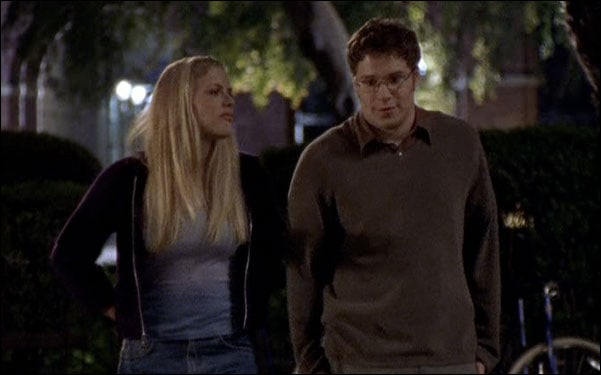
If any man’s being honest, they’ll admit most of their freshman year was spent either pursuing women, or figuring out better ways to pursue women, be it tanning booths, long gym sessions, or training in the pick-up arts (of which I will always argue, no such thing actually exists). Yes, it’s a bit of a gross thought, but it’s an undeniably true one, the freedom of living on campus explicitly married to the idea of newfound sexual freedom – and what makes “Truth or Dare” so compelling is how it turns that off-putting pursuit and mindset, into something endearing and emotional for the characters of Undeclared.
Let me be a little more specific: “Truth or Dare,” coming from the pens of Apatow and Rogen, does a wonderful job capturing the male experience: when it comes to Lizzie or Rachel, Undeclared is about as clueless as it would ever be, the women mostly existing as a gateway to explore its male characters. In terms of gender balance, Undeclared always skewed heavy to the male experience, even when it came to stories like Lizzie breaking up with Eric, which views the story mostly from Steven or Eric’s point of view. By the same token, “Truth or Dare” is equally disinterested in the sexual awakening of females in college – but at capturing the awkwardness and desperation of males, “Truth or Dare” is some of Undeclared‘s most well-formed, engaging material.
Each of the male characters fills a distinct role: Perry the reluctant virgin; Lloyd the overzealous ladies’ man; Steven, the nerd with a little game; and Marshall, the hopeless crusher. I’ve personally known all four types of these males in college (me? I was somewhere between Steven and Marshall, occasionally a combination of the two), and they all boil down to the same thing: yearning for the female touch, that moment where it feels like one’s truly embraced the college experience (funny how kids associate the “experience” with drinking and copulating, rather than classes? Advertising is subversive, y’all!). Sure, it’s a physical thing driven by the insatiable hormones of man, but it’s also an important emotional step in a young male’s journey, something “Truth or Dare” gives great voice to: sleeping with someone can be an emotional thing for a young male, too, deftly sideswiping the typical “horny white male” agenda to give a slightly more nuanced look at what drives the libidos of these young men.
See, sexual conquest in college is not really about the physical act for young males: ladies, don’t let any of this fool you. Just look to Lloyd’s posturing or Perry’s sheepish embarrassment: half of this nonsense is spouted just to fit in, right in line with the rest of the over-exaggerated personas males present to each other in their weird games of intimidation and dominance. The other half of it comes from a much more desperate place: on the surface, it appears each guy in the loft has their own reasons for wanting to play truth or dare. Underneath all of this, the guys just want to feel a connection with someone, even Lloyd, whose empty conquests to this point are forgotten in pursuit of Rachel, someone Lloyd has to recognize as a three-dimensional being. Even more so than women, men hate to be alone, and with most away from their mothers for the first time in their lives in college, they will seek out the comforts of a female in just about any way possible, mostly disguised under the much more masculine notion of “gettin’ laid, bro.”
“Is this a review or a psychology paper?” one might ask at this point, but it’s important to understand the behavior Undeclared is exploring, because the presentation of the material is so straightforward, the subtext of it all can be missed. It’s a clever, and quite realistically unintentional part of Rogen’s script, but it shines through in the third act, when Lloyd ends up alone, Ron finally gets to be a character (he’s shy! He has other personality traits! FINALLY!), and best of all, Steven finally admits to Lizzie that he’s scared to start fooling around with her, because it’s a world he’s never experienced before (he can’t even handle hearing her tell funny stories about fooling around with Eric in weird places; he’s got a lot to learn about the adult world, that poor kid). There’s an endearing heart at all of these stories, and it’s not often that “Truth or Dare” expresses it; but it’s some of the most rewarding character material in the series, along with being arguably the show’s most poignant reflection on a component of campus life.
Again, “Truth or Dare” does just about nothing for its female characters, using them as devices to explore the males in much greater detail. Surprisingly enough, that imbalance pays off in this particular case, paving the way for important moments of emotional growth for the immature guys at the core of Undeclared, striving to build out the underlying motivations of its characters (and by association, speak universally about the male experience at that age) – and in the process, delivering a hilarious and genuinely moving episode of television.
[Photo via FOX]
 Follow Us
Follow Us





